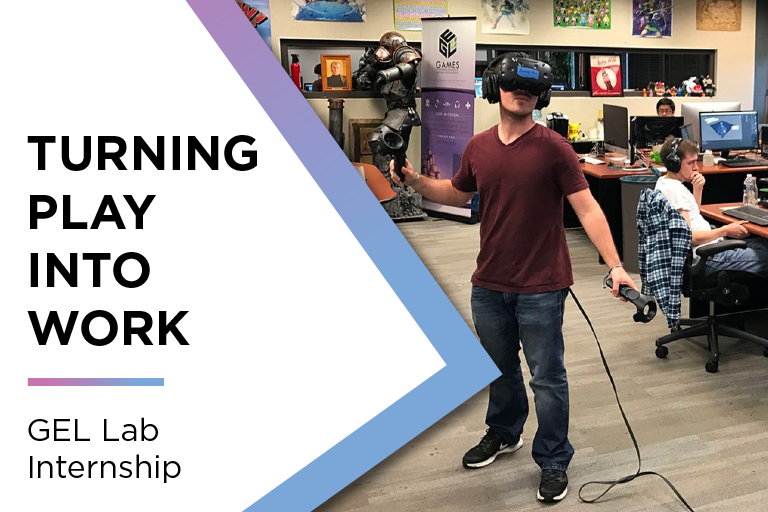If you asked most Michigan State University students what schoolwork they have to grind out in a week, they’d probably tell you they’re catching up on readings, working on a paper or reviewing notes for a big exam.
If you asked Mikayla Miklasz, she’d tell you her homework is playing and analyzing video games.
“My favorite part about my major has to be the fact that everyone sounds so excited for me when I mention what I do,” said Miklasz, a senior studying games and interactive media. "I didn’t realize how much fun being in a creative field could be.”
For students in this field of study, playing hard is how they work hard. And for a select few onboard the GEL Lab internship—where students’ leadership, production and game development skills are put to the test—their work can also benefit researchers and faculty right alongside games students.
This experience takes in clients and grants and enlists students to create various projects. This summer, the GEL Lab worked on Beyond Meet Space, a collective led by MSU’s Dr. Rabindra (Robby) Ratan and Brian Winn funded by the National Science Foundation. The program simulates real client-to-designer interactions, where students are given guidelines, expectations and feedback on how their games should look and function.
“Robby gave us a list of every ability and feature he wanted in the platform,” Miklasz said. “We would constantly be showing our work, allowing Robby and his team to come into that world, playtest and mess around. It was a lot of back and forth every week, having weekly meetings and making sure that everything was getting done.”
Fun met functionality with one of the main undertakings during the internship: creating a Meta-style VR meeting space that had the professionalism of an actual meeting room, but the coastal ambiance and entertaining characteristics of a tropical island.
Anthony Zheng, a senior studying games and interactive media, was the main 3D artist of this seaside oasis, which was imaginatively—and a bit ironically—also complete with a coliseum and castle.
"One of the most interesting things about VR is that you can do things that you could never do in real life,” Zheng said. “It’s just a much better alternative to meeting over Zoom.”
Just as Zheng believes the possibilities in VR are boundless, so are the many ways that video games and interactive media can benefit others. Throughout the internship’s duration, students also developed groundbreaking, meaningful projects right alongside the island meeting room.
“We made a VR doctor’s lab for nursing students, which will hopefully be distributed for nurses to train in,” Miklasz said. “We also did a 2D game for kids with malaria in Africa to test their brain activity and their development as they grow up in that environment. It’s really cool to see how fast a project changes, knowing where it started and where it left off—and it looks completely new.”
Though the VR island meeting space is in the cleanup phase, Miklasz said its eventual goal is for it to be open to the public. She is still completing production tasks for the project, which is work she wholeheartedly embraced and even hopes to pursue in the future.
“[Being a games producer] is a role you take on yourself, and it’s a role I fell in love with,” Miklasz said. “It was nice being in that position and seeing my own capabilities of doing three projects at once and knowing I’m working with the best of my peers.”
The connections and networking opportunities—whether it’s peers, professors or advisors—are a major benefit of the games program, according to Miklasz and Zheng.
“You’re working with the same 39-40 people for years,” Zheng said. “You really get to know each other.”
Miklasz echoed this statement, noting that the network of fellow students she’s made will be a valuable resource, no matter where she ends up.
“I came into college during COVID, when it took everything,” Miklasz said. “I didn’t have many friends, but through the games program and being forced into groups, I’ve met so many amazing people. It’s really motivating to know the people around me will be my future network in the field. They’re all so amazing.”
By Stella Govitz
